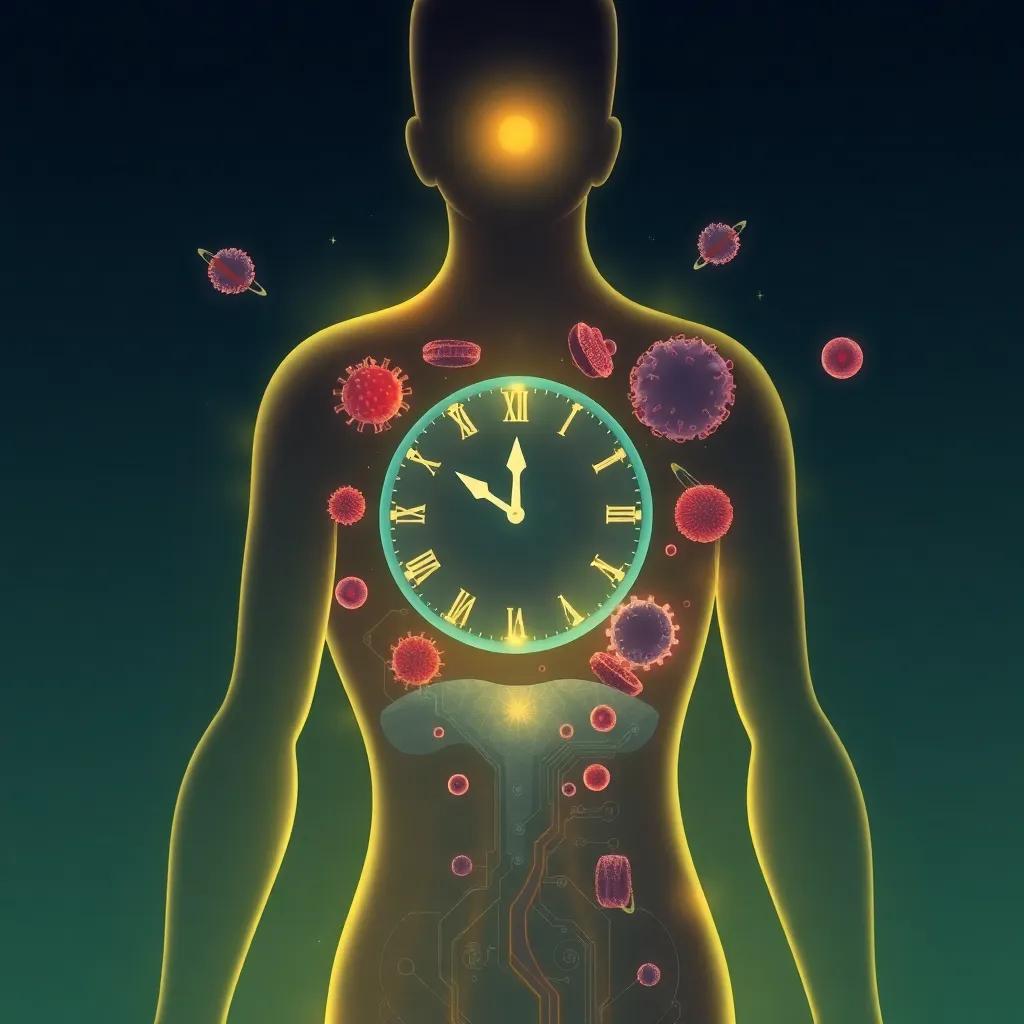Explore how circadian rhythms influence immune function, the impact of disruptions, and practical tips to align lifestyle with natural rhythms for better health.
Chronoimmunology reveals how our internal clock regulates immune responses, offering new insights into disease prevention and treatment.
Introduction to Chronoimmunology
Chronoimmunology is an emerging field that studies the intricate relationship between the circadian rhythm and the immune system. The circadian rhythm, often referred to as the body’s internal clock, regulates various physiological processes, including sleep-wake cycles, hormone release, and even immune responses. Recent research has shown that the timing of these immune responses can significantly impact overall health and disease prevention.
According to Dr. John Hogenesch, a professor of Pediatrics and Genomics at the University of Pennsylvania, The immune system is not static; it ebbs and flows with the time of day.
This statement underscores the importance of understanding how our internal clock influences immune function.
The Role of Circadian Rhythms in Immune Function
The circadian rhythm plays a crucial role in regulating the activity of immune cells, the production of cytokines, and the management of inflammation. For instance, studies have shown that certain immune cells, such as macrophages and T-cells, exhibit peak activity at specific times of the day. This temporal regulation ensures that the immune system is primed to respond to pathogens effectively.
Research published in the journal Nature Immunology highlights that circadian rhythms control the expression of genes involved in immune responses, thereby influencing the body’s ability to fight infections.
This finding suggests that disruptions in the circadian rhythm can lead to a weakened immune system, making the body more susceptible to infections.
Impact of Circadian Disruptions on Immune Health
Disruptions in the circadian rhythm, such as those caused by shift work, jet lag, or irregular sleep patterns, can have detrimental effects on immune function. A study conducted by the National Institutes of Health (NIH) found that shift workers are more likely to experience chronic inflammation and have a higher risk of developing autoimmune diseases.
This is because the misalignment of the internal clock can lead to dysregulation of immune responses, resulting in increased inflammation and reduced ability to combat infections.
Dr. Phyllis Zee, a sleep specialist at Northwestern University, emphasizes that maintaining a regular sleep schedule is crucial for optimal immune function. Even a single night of poor sleep can impair the body’s ability to produce cytokines, which are essential for fighting off infections.
Practical Tips for Aligning Lifestyle with Circadian Rhythms
To optimize immune function, it is essential to align your lifestyle with your body’s natural rhythms. Here are some practical tips:
- Sleep: Aim for 7-9 hours of quality sleep each night. Try to go to bed and wake up at the same time every day, even on weekends.
- Meal Timing: Eat meals at regular intervals and avoid late-night eating. Research suggests that eating in sync with your circadian rhythm can improve metabolic health and immune function.
- Light Exposure: Get plenty of natural light during the day and minimize exposure to artificial light at night. Light is a powerful regulator of the circadian rhythm.
Dr. Satchin Panda, a professor at the Salk Institute and author of The Circadian Code, advises that exposure to natural light in the morning can help reset your internal clock, while avoiding blue light from screens in the evening can improve sleep quality.
The Future of Chronoimmunology and Personalized Medicine
The field of chronoimmunology holds great promise for the development of new treatments for autoimmune diseases and infections. By understanding how the circadian rhythm influences immune responses, researchers can develop therapies that are timed to maximize efficacy and minimize side effects.
For example, a study published in Science Translational Medicine found that administering vaccines at specific times of the day can enhance their effectiveness.
This approach, known as chronotherapy, could revolutionize the way we treat various diseases.
Dr. Michael Smolensky, a chronobiologist at the University of Texas, predicts that in the future, personalized medicine will take into account an individual’s circadian rhythm to optimize treatment outcomes.
This could lead to more effective and targeted therapies for a wide range of conditions.
Conclusion
Chronoimmunology is a rapidly evolving field that offers new insights into the relationship between the circadian rhythm and the immune system. By understanding how our internal clock regulates immune function, we can take steps to optimize our health and prevent disease. From maintaining a regular sleep schedule to aligning meal times with our natural rhythms, small changes can have a significant impact on our immune health. As research in this field continues to advance, the potential for personalized, time-based therapies holds great promise for the future of medicine.




